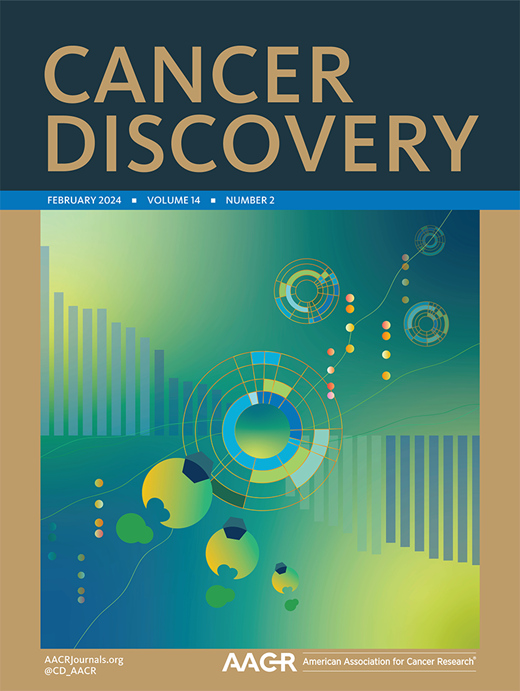EML4-ALK variant-specific genetic interactions shape lung tumorigenesis
IF 33.3
1区 医学
Q1 ONCOLOGY
引用次数: 0
Abstract
Diverse fusions of EML4 and ALK are oncogenic drivers in lung adenocarcinomas. EML4-ALK variants have distinct breakpoints within EML4, but their functional differences remain poorly understood. Here, we use somatic genome editing to generate autochthonous mouse models of EML4-ALK-driven lung tumors and show that V3 is more oncogenic than V1. By employing multiplexed genome editing and quantifying the effects of 29 putative tumor suppressor genes on V1- and V3-driven lung cancer growth, we show that many tumor suppressor genes have variant-specific effects on tumorigenesis. Pharmacogenomic analyses further suggest that tumor genotype can influence therapeutic responses. Analysis of human EML4-ALK-positive lung cancers also identified variant-specific differences in their genomic landscapes. These findings suggest that EML4-ALK variants behave more like distinct oncogenes rather than a uniform entity and highlight the dramatic impact of oncogenic fusion partner proteins and coincident tumor suppressor gene alterations on the biology of oncogenic fusion-driven cancers.EML4-ALK变异特异性基因相互作用影响肺肿瘤的发生
EML4和ALK的不同融合是肺腺癌的致癌驱动因素。EML4- alk变体在EML4中具有不同的断点,但是它们的功能差异仍然知之甚少。在这里,我们使用体细胞基因组编辑技术生成了eml4 - alk驱动肺肿瘤的本地小鼠模型,并表明V3比V1更具致瘤性。通过多重基因组编辑和量化29种推定的肿瘤抑制基因对V1和v3驱动的肺癌生长的影响,我们发现许多肿瘤抑制基因对肿瘤发生具有变异特异性作用。药物基因组学分析进一步表明,肿瘤基因型可以影响治疗反应。对人类eml4 - alk阳性肺癌的分析也确定了其基因组景观的变异特异性差异。这些发现表明,EML4-ALK变异体的行为更像是不同的癌基因,而不是统一的实体,并突出了癌基因融合伴侣蛋白和肿瘤抑制基因改变对癌基因融合驱动的癌症生物学的巨大影响。
本文章由计算机程序翻译,如有差异,请以英文原文为准。
求助全文
约1分钟内获得全文
求助全文
来源期刊

Cancer discovery
ONCOLOGY-
CiteScore
22.90
自引率
1.40%
发文量
838
审稿时长
6-12 weeks
期刊介绍:
Cancer Discovery publishes high-impact, peer-reviewed articles detailing significant advances in both research and clinical trials. Serving as a premier cancer information resource, the journal also features Review Articles, Perspectives, Commentaries, News stories, and Research Watch summaries to keep readers abreast of the latest findings in the field. Covering a wide range of topics, from laboratory research to clinical trials and epidemiologic studies, Cancer Discovery spans the entire spectrum of cancer research and medicine.
 求助内容:
求助内容: 应助结果提醒方式:
应助结果提醒方式:


